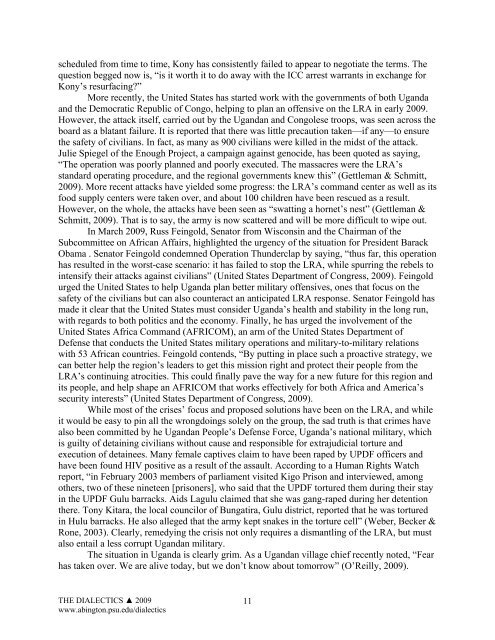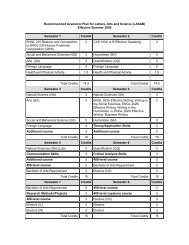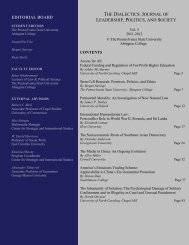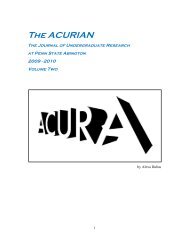Vol. III - Penn State Abington
Vol. III - Penn State Abington
Vol. III - Penn State Abington
You also want an ePaper? Increase the reach of your titles
YUMPU automatically turns print PDFs into web optimized ePapers that Google loves.
scheduled from time to time, Kony has consistently failed to appear to negotiate the terms. The<br />
question begged now is, “is it worth it to do away with the ICC arrest warrants in exchange for<br />
Kony’s resurfacing”<br />
More recently, the United <strong>State</strong>s has started work with the governments of both Uganda<br />
and the Democratic Republic of Congo, helping to plan an offensive on the LRA in early 2009.<br />
However, the attack itself, carried out by the Ugandan and Congolese troops, was seen across the<br />
board as a blatant failure. It is reported that there was little precaution taken—if any—to ensure<br />
the safety of civilians. In fact, as many as 900 civilians were killed in the midst of the attack.<br />
Julie Spiegel of the Enough Project, a campaign against genocide, has been quoted as saying,<br />
“The operation was poorly planned and poorly executed. The massacres were the LRA’s<br />
standard operating procedure, and the regional governments knew this” (Gettleman & Schmitt,<br />
2009). More recent attacks have yielded some progress: the LRA’s command center as well as its<br />
food supply centers were taken over, and about 100 children have been rescued as a result.<br />
However, on the whole, the attacks have been seen as “swatting a hornet’s nest” (Gettleman &<br />
Schmitt, 2009). That is to say, the army is now scattered and will be more difficult to wipe out.<br />
In March 2009, Russ Feingold, Senator from Wisconsin and the Chairman of the<br />
Subcommittee on African Affairs, highlighted the urgency of the situation for President Barack<br />
Obama . Senator Feingold condemned Operation Thunderclap by saying, “thus far, this operation<br />
has resulted in the worst-case scenario: it has failed to stop the LRA, while spurring the rebels to<br />
intensify their attacks against civilians” (United <strong>State</strong>s Department of Congress, 2009). Feingold<br />
urged the United <strong>State</strong>s to help Uganda plan better military offensives, ones that focus on the<br />
safety of the civilians but can also counteract an anticipated LRA response. Senator Feingold has<br />
made it clear that the United <strong>State</strong>s must consider Uganda’s health and stability in the long run,<br />
with regards to both politics and the economy. Finally, he has urged the involvement of the<br />
United <strong>State</strong>s Africa Command (AFRICOM), an arm of the United <strong>State</strong>s Department of<br />
Defense that conducts the United <strong>State</strong>s military operations and military-to-military relations<br />
with 53 African countries. Feingold contends, “By putting in place such a proactive strategy, we<br />
can better help the region’s leaders to get this mission right and protect their people from the<br />
LRA’s continuing atrocities. This could finally pave the way for a new future for this region and<br />
its people, and help shape an AFRICOM that works effectively for both Africa and America’s<br />
security interests” (United <strong>State</strong>s Department of Congress, 2009).<br />
While most of the crises’ focus and proposed solutions have been on the LRA, and while<br />
it would be easy to pin all the wrongdoings solely on the group, the sad truth is that crimes have<br />
also been committed by he Ugandan People’s Defense Force, Uganda’s national military, which<br />
is guilty of detaining civilians without cause and responsible for extrajudicial torture and<br />
execution of detainees. Many female captives claim to have been raped by UPDF officers and<br />
have been found HIV positive as a result of the assault. According to a Human Rights Watch<br />
report, “in February 2003 members of parliament visited Kigo Prison and interviewed, among<br />
others, two of these nineteen [prisoners], who said that the UPDF tortured them during their stay<br />
in the UPDF Gulu barracks. Aids Lagulu claimed that she was gang-raped during her detention<br />
there. Tony Kitara, the local councilor of Bungatira, Gulu district, reported that he was tortured<br />
in Hulu barracks. He also alleged that the army kept snakes in the torture cell” (Weber, Becker &<br />
Rone, 2003). Clearly, remedying the crisis not only requires a dismantling of the LRA, but must<br />
also entail a less corrupt Ugandan military.<br />
The situation in Uganda is clearly grim. As a Ugandan village chief recently noted, “Fear<br />
has taken over. We are alive today, but we don’t know about tomorrow” (O’Reilly, 2009).<br />
THE DIALECTICS ▲ 2009<br />
www.abington.psu.edu/dialectics<br />
11







